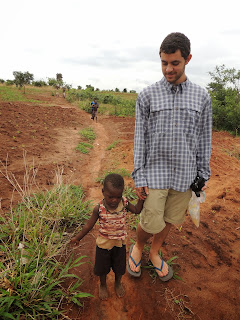Weekends are laid back in Malawi,
which is a nice change of pace from our hectic past few days. Daniel picked us
up at 10:30 (read: 11:20) this morning and we headed into the community to collect
our first water samples. We’ve been focusing primarily on interviewing community
members, but since Saturdays and Sundays are typically days for rest, worship,
and fun in the community we decided to take some preliminary samples, which
only required Daniel’s help. We’ve seen a range of the water sources the
community relies on in the past few days. Some look ok – there are two
boreholes in Kumponda Village which seem popular, and most people have said
that it’s their first choice for drinking water. But we’ve also heard they’re
not always reliable, so we checked out some of their alternative sources as
well. The first the community calls a well, but that’s not the first word that
comes to mind looking at it. It’s a hole in the ground about 5 feet deep and 6
feet across. Every time we’ve seen it there has been about a foot of muddy
water standing in the bottom, and today was no different. Regardless, in the
five minutes we took gathering a sample there was already a queue to fill up
buckets. We asked some people waiting why they chose this source and if the
water makes them sick. They said that the walk to the borehole is too far when
they are feeling sick or weak – even if the well water makes them more so. We
also heard that the well had been there for a long time, although we’re still
unsure about how long. One woman, who was somewhere between 50 and 80, said
that it had been there since before she was born. We’ll be looking more into
this next week. Daniel has explained that clarity is almost exclusively the criteria
community members use to determine if the water is safe to drink, so they’ll
often let the sediment fall from the ‘well water’ and drink the clear water
they scoop off – a serious concern of ours.
Both of the boreholes pump clear
water, and (we think) reach a confined aquifer about 32 meters deep. The first
pump is adjacent to the primary school and chief’s house in Kumponda village.
Here, we met the group of about ten kids who have consistently greeted us in
the village, between three and thirteen years old. After grabbing some quick
samples from the pump, we were led to the Lunzu River, which is just shy of a
kilometer from the borehole and flows through the Group Village. Being escorted
by our friends was fun, and they were excited as always to be photographed.
They’ve been interactive with us, giggling and smiling and talking in Chichewa,
but today we learned that some of them actually speak pretty good English. Many
of them also worked up the courage today to hold our hands while we walked – a common
gesture for people of all ages in Malawian
culture, but also heart-wrenchingly adorable.
The river itself is pretty astonishing. I’ve
never seen flowing water that was so opaque - it’s about the same color as the
milky Mzuzu coffee Matt and I have been inhaling since our arrival. The banks
are grassy with large smooth rocks serving as the access point (but thankfully
no hippos in sight). We know this is another alternative source of drinking and
washing water for many of the villages within Kumponda Group Village, and we
have heard that illness often comes after consumption. After some final sample gathering and goodbyes
to our friends, we headed back into Blantyre. We had our first interaction with
wildlife when a big, black waspy guy flew in the car window and hit my tooth
(sting free) and another got trapped between Munir’s hand and foot (not sting
free). After a stop at the ShopRite (which is basically the same as an American
supermarket, not my expectation in the least) to pick up a few more groceries,
Daniel joined us for a lunch of hamburgers at our house (graciously made by
Arash and Munir).
Got a good dose of translation
laughs when a traffic light was out and Daniel told us that the robot was
broken, conjuring up imagery that was more Jetsons than traffic calming. His English
is great, but we’ve been particularly enjoying some of the subtle differences
in phrasing, like in the aforementioned car/mud/ditch adventure when he said we
were in “hot soup” instead of “hot water.” I think the people here have been enjoying
our butchered Chichewa as well – our greeting routines consistently draw belly
laughs from the people we meet (even though I think we’re all getting our Muli
Bwanjes down pretty well…?)
http://www.youtube.com/watch?v=KXnL7sdElno
http://www.youtube.com/watch?v=KXnL7sdElno
Daniel and the rest of AFES have
been incredibly gracious hosts and we couldn’t feel more welcome here. To
reiterate past posts, I’m continually astonished with the unrefined warmth of
the Malawians we have met. I’ve never seen such heartbreaking poverty in my
entire life, yet have felt instantly welcomed every place we’ve visited.
Tomorrow we’ll be taking the day to do some analysis of the info we’ve gathered
so far and to assess what we have left to do in our final week (wait….what??).
All for now,
Alice



Keep up the fabulous work! I'm thinking about you guys everyday, be safe!
ReplyDelete